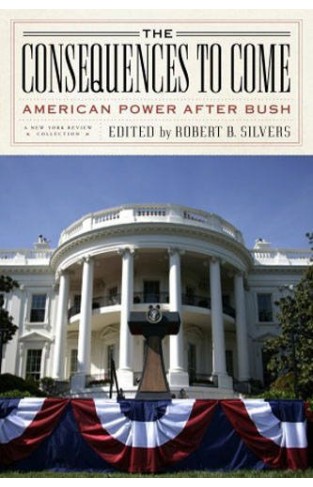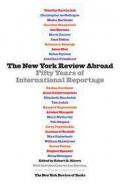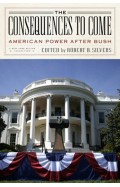the consequences to come
By: Robert B Silvers
-
Rs 8,990.00
Due to constant currency fluctuation, prices are subject to change with or without notice.
We are offering a high discount on this book due to its “SLIGHTLY DAMAGED” condition |
For the past seven years The New York Review of Books has critically examined the Bush administration’s policies at home and abroad. In this collection of essays, nine of the Review’s contributors assess the human and political costs of the war on terror and the occupation of Iraq, and look ahead to the issues shaping the 2008 election campaign.
The presidency of George W. Bush, as Jonathan Freedland noted, has created a near consensus that the “invasion of Iraq was a calamity” and has “reduced America’s standing in the world and made the United States less, not more secure.” Joan Didion described Vice President Dick Cheney as “the central player in the system of willed errors and reversals that is the Bush administration.”
Peter Galbraith argued that from the beginning of the occupation of Iraq, Bush “facilitated the very event he warned would be a disastrous consequence of a US withdrawal from Iraq: the takeover of a large part of the country by an Iranian-backed militia.”
As the presidential campaign got underway, Michael Tomasky explained that “despite Bush’s failures and the discrediting of Republican governance, there is every chance that the next Republican president, should the party’s nominee prevail...will be just as conservative as Bush has been—perhaps even more so.” And Frank Rich predicted that it would take the Democrats’ “full powers of self-immolation” to lose the White House in 2008.
The Consequences to Come contributors: Joan Didion, Joseph Lelyveld, Mark Danner, Peter Galbraith, Jonathan Freedland, Jonathan Raban, Frank Rich, Michael Tomasky, Arthur Schlesinger Jr.
We are offering a high discount on this book due to its “SLIGHTLY DAMAGED” condition |
For the past seven years The New York Review of Books has critically examined the Bush administration’s policies at home and abroad. In this collection of essays, nine of the Review’s contributors assess the human and political costs of the war on terror and the occupation of Iraq, and look ahead to the issues shaping the 2008 election campaign.
The presidency of George W. Bush, as Jonathan Freedland noted, has created a near consensus that the “invasion of Iraq was a calamity” and has “reduced America’s standing in the world and made the United States less, not more secure.” Joan Didion described Vice President Dick Cheney as “the central player in the system of willed errors and reversals that is the Bush administration.”
Peter Galbraith argued that from the beginning of the occupation of Iraq, Bush “facilitated the very event he warned would be a disastrous consequence of a US withdrawal from Iraq: the takeover of a large part of the country by an Iranian-backed militia.”
As the presidential campaign got underway, Michael Tomasky explained that “despite Bush’s failures and the discrediting of Republican governance, there is every chance that the next Republican president, should the party’s nominee prevail...will be just as conservative as Bush has been—perhaps even more so.” And Frank Rich predicted that it would take the Democrats’ “full powers of self-immolation” to lose the White House in 2008.
The Consequences to Come contributors: Joan Didion, Joseph Lelyveld, Mark Danner, Peter Galbraith, Jonathan Freedland, Jonathan Raban, Frank Rich, Michael Tomasky, Arthur Schlesinger Jr.
The New York Review Abroad: Fifty Years of International Reportage (Nyrb Collections)
By: Robert B Silvers
Rs 1,797.00 Rs 2,995.00 Ex Tax :Rs 1,797.00
Zubin Mehta: A Musical Journey (An Authorized Biography)
By: VOID - Bakhtiar K. Dadabhoy
Rs 630.00 Rs 1,050.00 Ex Tax :Rs 630.00
The Art of Quiet Influence - Timeless Wisdom for Leading Without Authority
By: Jocelyn Davis
Rs 2,515.50 Rs 2,795.00 Ex Tax :Rs 2,515.50
Blood and Silk: Power and Conflict in Modern Southeast Asia
By: Michael Vatikiotis
Rs 3,836.00 Rs 4,795.00 Ex Tax :Rs 3,836.00
Walt Disney; Triumph of the American Imagination(Deckle Edge)
By: Neal Gabler
Rs 2,895.00 Ex Tax :Rs 2,895.00
Apple: The inside Story of Intrigue, Egomania, and Business Blunders
By: Jim Carlton
Rs 236.00 Rs 295.00 Ex Tax :Rs 236.00
Top Secret America: The Rise of the New American Security State
By: Dana Priest
Rs 5,806.50 Rs 8,295.00 Ex Tax :Rs 5,806.50
Myths Illusions and Peace: Finding a New Direction for America in the Middle East
By: Dennis Ross
Rs 1,095.00 Ex Tax :Rs 1,095.00
Operation Dark Heart: Spycraft And Special Ops On The Frontlines Of Afghanistan And The Path To Victory
By: Anthony Shaffer
Rs 1,350.00 Rs 2,250.00 Ex Tax :Rs 1,350.00
Anna Hazare: The Face Of Indias Fight Against Corruption
By: Pradeep Thakur
Rs 270.00 Rs 300.00 Ex Tax :Rs 270.00
How To Win A Cosmic War God Globalization And The End Of War
By: Reza Aslan
Rs 695.00 Ex Tax :Rs 695.00
Witness To America: A Documentary History Of The United States From The Revolution To Today
By: Douglas Brinkley
Rs 3,496.50 Rs 4,995.00 Ex Tax :Rs 3,496.50
The Art of Quiet Influence - Timeless Wisdom for Leading Without Authority
By: Jocelyn Davis
Rs 2,515.50 Rs 2,795.00 Ex Tax :Rs 2,515.50
Blood and Silk: Power and Conflict in Modern Southeast Asia
By: Michael Vatikiotis
Rs 3,836.00 Rs 4,795.00 Ex Tax :Rs 3,836.00
Walt Disney; Triumph of the American Imagination(Deckle Edge)
By: Neal Gabler
Rs 2,895.00 Ex Tax :Rs 2,895.00
Apple: The inside Story of Intrigue, Egomania, and Business Blunders
By: Jim Carlton
Rs 236.00 Rs 295.00 Ex Tax :Rs 236.00
Top Secret America: The Rise of the New American Security State
By: Dana Priest
Rs 5,806.50 Rs 8,295.00 Ex Tax :Rs 5,806.50
No recently viewed books available at the moment.
Zubin Mehta: A Musical Journey (An Authorized Biography)
By: VOID - Bakhtiar K. Dadabhoy
Rs 630.00 Rs 1,050.00 Ex Tax :Rs 630.00
The New York Review Abroad: Fifty Years of International Reportage (Nyrb Collections)
By: Robert B Silvers
Rs 1,797.00 Rs 2,995.00 Ex Tax :Rs 1,797.00
The Art of Quiet Influence - Timeless Wisdom for Leading Without Authority
By: Jocelyn Davis
Rs 2,515.50 Rs 2,795.00 Ex Tax :Rs 2,515.50
Blood and Silk: Power and Conflict in Modern Southeast Asia
By: Michael Vatikiotis
Rs 3,836.00 Rs 4,795.00 Ex Tax :Rs 3,836.00
Walt Disney; Triumph of the American Imagination(Deckle Edge)
By: Neal Gabler
Rs 2,895.00 Ex Tax :Rs 2,895.00
Apple: The inside Story of Intrigue, Egomania, and Business Blunders
By: Jim Carlton
Rs 236.00 Rs 295.00 Ex Tax :Rs 236.00
Top Secret America: The Rise of the New American Security State
By: Dana Priest
Rs 5,806.50 Rs 8,295.00 Ex Tax :Rs 5,806.50















-120x187.jpg?q6)



















